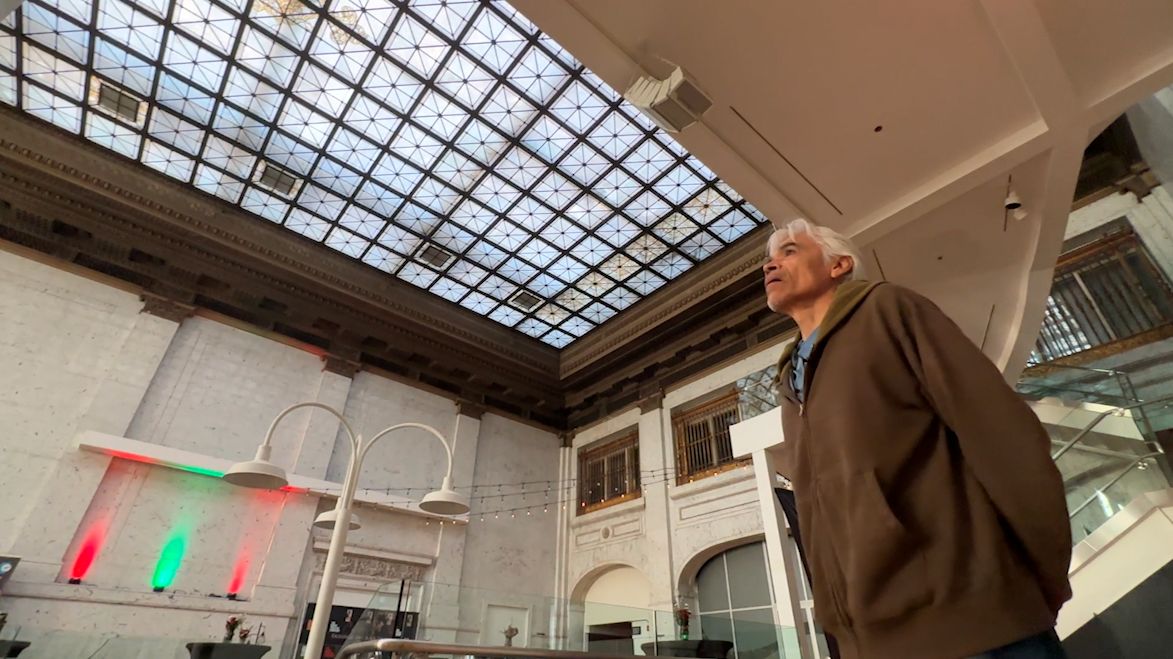LOS ANGELES — Seeing a show doesn’t have to break the bank — even if it’s in a bank — which is exactly what the Los Angeles Theatre Center used to be.
“This entrance here is a vault, an actual vault,” Sal Lopez said, standing beside a thick gold-rimmed door with a glass front revealing the gears and mechanisms inside. “This is the actual thing that was here when it was a bank.”
There are other similar clues to its past life throughout the space. Cutouts in the wall reveal the thickness of the concrete. Windows overlook the lobby, which Lopez points out is the largest theater lobby west of the Mississippi River. He has spent decades of his life in this building and it still takes his breath away.
“Anytime I walked through these doors, I marvel,” he admitted, gazing up at the lobby’s ornate glass ceiling. “This ceiling is from the original back in the day.”
Lopez is one of the Associate Artistic Directors of Latino Theater Company — the resident company which oversees programming at the LATC. He and his four longtime colleagues, including artistic director José Luis Valenzuela, have been involved in the company for nearly four decades, growing the space from three theaters to now five unique spaces ranging from small black boxes to the nearly 500 seat Tom Bradley Theatre.
Right now, they have three shows running simultaneously, and one of their goals Lopez said is to make sure there are no barriers to experiencing the arts.
“We’re very proud that we make our tickets accessible to everyone,” he pointed out. “I mean, you can come tonight and pay $10 to see a live show. And so, you know, that’s less than a movie to see live theater. And that’s something we’re very proud of.”
One of the shows about to take its final bow in the space is “The Travelers” by Luis Alfaro who also has a long history with the building.
“When I was young, my first major professional show was a solo show I did called ‘Downtown,’” he recalled. “I did it downstairs at theater three. I got my equity card, and I was really, really excited.”

It’s fitting that Alfaro’s initials are L.A. because he has been woven into the fabric of the city and its theater community from his early days as an usher at the Music Center to now a prolific internationally acclaimed playwright.
“Oh my god, I’m on like 27,” he said with a laugh, “and I have two other new ones this year.”
“The Travelers” returns to his family’s roots and the agricultural fields of the Central Valley. His mother’s family were all farmworkers and his parents were heavily involved in the farmworkers’ movement in the 1970s.
“I wanted to write about California,” Alfaro said of his inspiration. “I’m trying to uncover all these California stories. It’s an extraordinary place. We speak 224 different languages here, right?”
Although his works have been presented around the world, he said there aren’t all that many mainstream spaces available where Latino stories get told, or at least don’t get told by Latino voices. This complex is special not only because it is in the heart of downtown Los Angeles, but it tells the stories of the people who surround it.
“If every community had the opportunity to name themselves, we’d be in a much healthier place. And that’s what theater does,” Alfaro explained. “Theater gives you the opportunity to dream, to see yourself as you are, but also to see a mirror of yourself as you can be, and how we might in the current culture be reflected.”
There was a time in the early 1990s, Lopez said, when this space almost disappeared. The city owns the building and was planning to close it.
“We had a sit-in,” he remembered. “We actually camped here with our children back then. I think it was like 10 days or something, and the city heard us and they kept the building open.”
Later, there was a plan to sell it which lead to a legal battle. In the end, the Latino Theater Company was awarded a 20-year lease that has since been extended to 50 years. And they are making good use of their time. Since the start of that lease in 2007, they’ve created a lot of art — over 150 plays — and a lot of jobs — over 4,000.
Lopez and his colleagues have been here since the beginning, running things like, a “democratic dictatorship,” they joke.
“We’ve been together for so many years, going on 38, 39 years,” Lopez said with another hint of marvel in his voice. “We’ve been together longer than most marriages, especially in Hollywood.”
With a lease extending to 2056, they are in the process of creating a succession plan, to make sure the next generation of leaders are ready to continue their legacy of creating theater for the community by the community.
“We hope that this theater’s around here forever and telling stories that reflect our experience,” he said, “because when you share a story together, you realize we’re not that different, and I think it transcends the different barriers that, that separate us.”



